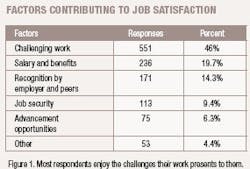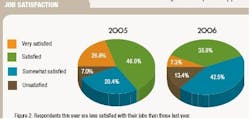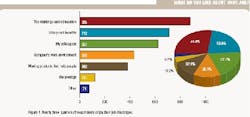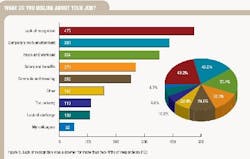2006 Salary Survey: Does your job provide you with the right chemistry?
Whether your job provides you with the right mix of pay, benefits, and gratification was the focus of the 2006 Chemical Processing salary and job satisfaction survey. While the majority of survey respondents told us that they are content with their salaries, benefits, and job fulfillment, job satisfaction has declined and the biggest complaints are lack of recognition, followed by negative public opinion of the industry.
Combining the average responses in several categories of the survey provides a profile of a typical chemical engineer (Table 1). That person would be male, with a bachelors degree, age 47, satisfied with his job, working 46.7 hours per week at an annual salary of $89,690after a 3.84% raise. This contrasts with average pay of $85,230 and raises of 3.1%reported in the 2005 survey. This years survey garnered 1,258 respondents compared to 1,205 last year.. The largest group of wage earners in the 2006 survey was 102 people (8.4%) who said they earn $100,000 to $105,000. In 2005, the largest group of wage earners was in the $75,001 to $80,000 salary range with 94 respondents (7.84%).
Most respondents (738 or 61%) got a raise in the range of 2.5% to 5%. Additionally, 698 of this years survey participants (58.5%) believe they are adequately compensated for their experience and skills, versus 496 respondents (41.5%) reporting they are not.
Is your job satisfying?
While the bulk of respondents said they are satisfied with their jobs, the number dissatisfiedwas higher than last year (Figure 1). This year, 172 respondents (13.4%) said they were unsatisfied, compared to 83 respondents (7%) in the 2005 survey. In a similar vein, the number of people very satisfied with their job also dropped 87 people (7.3%) this years versus 244 people (20%) in 2005.
The work can be challenging and rewarding, and there will always be opportunities in the industry, says one respondent. But those opportunities are decreasing. The chemical industry in the United States is mature, under extreme pressure from globalization, and is in decline in many areas. Most of the action in the chemical industry will be outside the U.S. for the foreseeable future.
Challenging work remains the top contributor to respondents job satisfaction (Figure 2). Salary and benefits, and recognition by employer and peers are the next most important factors for job satisfaction, respectively (Figure 3). These responses match last years results.
Click to enlarge Figure 3
You have to be dedicated to your work, says one survey participant. The hours are long and the work schedule is stressful at times. However completing a project is sometimes very satisfying
Another respondent adds, The refining industry continues to be vibrant and opportunistic. For a chemical engineer, refining offers some of the best opportunities of any industry to apply engineering skills. Refining technology and feedstocks constantly change and evolve resulting significant and exciting technical and career growth opportunities.
Recognition needed
The greatest number of respondents (475 or 43.2%) took umbrage at lack of recognition as (Figure 4).
Click to enlarge Figure 4
Be prepared to be treated as a commodity. Engineering is not acknowledged as a profession on par with the education required, says a respondent.
The company work environment, hours and workload, salary and benefits, and commute and traveling were the next most common dislikes, respectively. Hard work and good intentions are not rewarded, only results, or the appearance of results, contends one survey participant. Being in the right place at the right time or knowing the right people is rewarded. There is no longer any pretense that seniority or dedication have value. In fact, there is a strong sense that staying with one employer is a weakness. There is no job security at all even with good ratings, years of dedicated service, and an expanding work force.
Another respondent adds, There is no job security. If the financial folks decide that they cant get more than 40% margin on products, the site, positions are gone. Companies talk about their most valuable resource which is people, but that is just PR they put out, the most important thing is what Wall Street says, meaning they dont care about work culture, etc. What is rewarded is short-term growth and individuals who go along with the system.
Concerned about perceptions
Negative public opinion of the industry bothered nearly half of the respondents (588 or 49.7% (Figure 5).Much of the public's perception of the chemical industry is based on accidents and a few willful violations, says one of you. Granted many of these could have been prevented by following proper safety procedures and the law. In fact, the chemical industry is one of the safest to work in. Additionally the benefits that the chemical industry provides touch every single aspect of our lives in a positive way. Furthermore, products provided by the industry save countless lives annually. Just imagine a world without polymers, pesticides, fuels and the like.
Click to enlarge Figure 5
Another respondent adds, It is unfortunate that a few bad apples in the chemical industry can have such a negative impact on the public perception of our industry especially after all of the significant improvements made in both safety and environmental stewardship, and the benefits to the public from the products and services offered by the chemical industry.
Another respondent blames educators for the negative public perception. Our public school teachers spend a lot of time describing the dangers and hazards brought by chemicals. They are apparently not aware that each of us is a magnificent, complicated chemical factory doing a certain amount of pollution. I wish they would be more positive about the successes of chemistry.
Advice for the future
Respondents offered a variety of observations, advice and comments about the industry, which shows concern about the future. My major concern is not for me, but for the next generation, says one of you. We are losing industry at an alarming rate, mainly because we have given it away. Also we are losing more because we have become so inefficient. I can't believe the change over the last 30 years.
Many survey participants advised against going into the chemical engineering field. Others provided more detailed explanations as to why they recommend staying away from the industry. I would not recommend the chemical industry to younger people, says one survey participant. It is an industry that has shrunk and does not offer growth potential over the long haul. Salary compression is common and there is no loyalty to employees by the large companies that operate in the industry.
Another respondent says, I have seen constant downsizing and outsourcing of chemical engineering opportunities in the U.S. and Im unsure of the long-term security of chemical engineering in the U.S. It appears to me that chemical production is going the way of the steel industry did back in the 1970s.
Learning certain foreign languages is useful, counsels another respondent, Learn Mandarin, Arabic or other foreign language. North America will continue to lose manufacturing jobs to China, India and the Middle East for the foreseeable future. Even higher skilled R&D and design work will be offshored as these regions develop their own markets and products. There is no job security in the chemical industry, so if that's important to you consider another field.
Another respondent cautions that engineering is more than meets the eye. Engineering is not simply engineering. You must understand office and corporate politics. Good ideas die on the vine because they are not recognized and bad ideas are advanced due to sex appeal. Just because the boss is an engineer, doesn't mean he/she actually grasps the concepts.
And this respondent says, Consider your other career options very carefully. Unless there is a significant change in the cost of energy in this country, the long-term future of the U.S. chemical industry is in jeopardy. Acquiring the knowledge and technical skill necessary to have a successful career in chemical engineering is difficult and requires intelligence, self-discipline, and motivation. Individuals with these qualities should be aware that they may be able to have a more successful and lucrative career in other fields that have a more promising long-term future. I am the fourth generation of my family to be associated with the American chemical industry, but I will be recommending to my own children that they should pursue other areas of study for their careers.
Finally, representative of those highly satisfied with their jobs, this respondent says, Science is a great field, because the work that you do (discovery) CAN make a difference. Everyone needs a reason to get up every morning and go to work-what better reason than with the opportunity to help mankind-and make a great salary with excellent benefits!
There are several other noteworthy areas to point out from the survey results. Following is a summary of those statistics.
Job security
Slightly more respondents (51.3%) are concerned about job security than those who are not (48.7%). In contrast to numerous reader comments expressing concern about the future of the industry, nearly a third of you (30.1%) believe there is a very slight chance of being laid off or fired within the next two years. Another 13.1% believe there is no chance of either, while another 27.4% say there is a slight chance.
However, 21.2% foresee a moderate chance of lay offs or firings within that time frame. Just 5.1% feel there is a high chance and only 3% believe there is a very high likelihood of layoffs or firings.
Workload
The average work week totaled 46.7 hours, according to survey results, with almost two-thirds of respondents (65.4%) working between 41 to 50 hours per week, another 20.2% working 51 to 60 hours, and 9.2% working a 31 to 40 hour work week. Some of you (3.7%) are working 61 to 70 hours per week, with another 0.4% working more than 70 hours each week.
On the low end, 0.7% reported working between 20 to 30 hour weeks and another 0.3% working less than 20 hours weekly.
Those who are working overtime could select multiple reasons for the extra hours. Nearly all respondents (90%) do so mostly to get their work done (90%). Another 19.6% say they work overtime to satisfy supervisors or superiors, with 15.1% choosing to do so to advance their careers, and 6.4% working overtime to earn extra money.
Bonuses
The average bonus paid is about $4,795, according to this years survey results, compared to the $4,631 average bonus reported in last years survey. Most of the bonuses paid are based on business unit financial performance or meeting or exceeding individual performance expectations.
The largest group of respondents (31.8%) got a bonus of between 0 and $1,000.Conversely, the second largest group of respondents (21.5%) reported bonuses exceeding $10,000. Another 17.5% said they received between $2,501 to $5,000 in bonuses, with 10.8% receiving $5,001 to $7,500, and 6.7% getting a bonus from $7,501 to $10,000.
Benefits
For the second consecutive year, profit sharing remained the most valued benefit that respondents (17.9%) do not receive, followed by stock options (13.9%), flextime (13.7%), telecommuting (12.5%) and a pension plan (11.1%), respectively.
The most common benefits that respondents do receive are medical insurance (95.7%), life insurance (89.7%), 401(k) or similar plan with matching contributions (88.9%), dental insurance (87.9%), disability insurance (79.4%), and education reimbursement (64.7%).
Staffing
Staffing level statistics over the past two years are nearly identical, according to survey results. This year, 39.4% say staffing levels where they work is the same as a year ago, whereas 37% reported no change in last years survey.
However, more respondents reported increases than last year. 25.2% cited somewhat larger and 3.2% significantly larger staffing, compared to 20.54% and 2.25% respectively in 2005. Similarly, 24.7% say staffing has been somewhat smaller over the past 12 months, compared to 28% in 2005. Less people are reporting significantly smaller staffing, with 7.5% this year, and 12% last year.
Job stability
Over one quarter of respondents (27.7%) have been with their current employer for from 0 to 5 years, followed by another 20.6%, who have remained at their company for 6 to 10 years. Almost the same number (13.8% and 14%, respectively) have stayed with the same company for11 to 15 years, and for 16 to 20 years.
Almost 15% reported even longer job tenure, staying with the same company for 26 to 30 years (8%), 31 to 35 years (5.2%), 36 to 40 years (1%), and 0.3% at more than 40 years.
Vacations
While more than a quarter of you (27.2%) are receiving 16 to 20 days of vacation time, compared to the actual vacation time taken, which is likely to be 11 to 15 days (31%). The top remaining vacation days received, according to the survey results are 11 to 15 days (27%), and 21 to 25 days (25.1%).
Similar to the leading category, there is an approximately 5% discrepancy in each of the other leading levels between vacation days received and vacation days actually taken. For actual vacation time taken, 25.3% take 16 to 20 days and 19.8% take 21 to 25 days.
As the survey data are gathered over a longer period of time, more trends will likely emerge in years to come.







